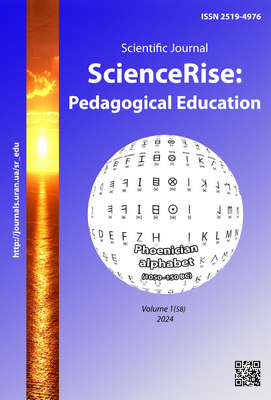Use of museum pedagogics in the training of teachers of social sciences
DOI:
https://doi.org/10.15587/2519-4984.2024.298865Keywords:
museum pedagogy, technology, museum resource, museum environment, forms, methods, techniques of museum pedagogyAbstract
The article defines museum pedagogy as an interdisciplinary educational technology that develops in the field of academic and non-formal education, covering various forms of communication, current educational programs and cultural practices and is a basic element of the program-targeted management of the activities of applicants and scientific-pedagogical workers in the museum-pedagogical environment , a means of its practical implementation, a kind of activity plan, in which the connections of the defined goal and the mechanisms of its achievement are clearly established; the general principles that must be relied upon in the application of museum pedagogy in the process of training a social science teacher are outlined; the concept of "museum resource" is presented as the ability to increase the power of professional and pedagogical potential, to reproduce and deepen the content of educational programs in the exposition, to be accessible and suitable for implementation in the conditions of the educational process, understandable for the majority of consumers of museum information, important components of which contribute to professional training future history teacher, there are: museum-pedagogical information, which contains news about specific museum-pedagogical and educational programs and their specifics; educational and methodological support of programs; forms and methods of pedagogical activity in the museum environment; results of the pedagogical process and results of research and experimental work; expert assessments of specialists, etc.; "museum environment" as a certain active space for learning and educating students of pedagogical specialties and a perfect means of implementing productive changes in teacher training, which ensures direct "communication" with original museum objects and active participation in various types of activities, organized on the basis of museums, the ability to awaken in future teachers' desire for professional and personal self-realization, to form stable humanistic orientations, a conscious positive attitude towards society, children, pedagogical activity and oneself, which causes deeper personal professionalization and creates conditions for correction of professional growth; directions of work with student audiences, organizational forms, methods, techniques of use in the educational activity of museums are substantiated; it is proposed to include in the educational and professional training program of historians the educational component "Fundamentals of museum and archive work" and to create a complex of methodical support for the proposed discipline
References
- Pavlenko, Yu. (2007). Stan praktychnoho vykorystannia muzeiv pedahohichnoho profiliu u profesiinii pidhotovtsi maibutnikh uchyteliv. Imidzh suchasnoho pedahoha, 5-6, 7–10.
- Pavlenko, Y., Lуmar, Y. (2022). Museum pedagogy in the future primary teachers’ professional training. NewInception, 3-4 (5-6), 62–70. https://doi.org/10.5281/zenodo.5972472
- Karamanov, O., Surmach, O., Shukalovych, A. (2020). Museum pedagogy in the bachelor’s training system: possibilities of the pedagogical college. Ukrainian Educational Journal, 1, 100–107. https://doi.org/10.32405/2411-1317-2020-1-100-107
- Snahoschenko, V. (2011). Museum and educational resources in the professional training of History teachers-to-be. Teoriia ta metodyka navchannia suspilnykh dystsyplin, 1, 23–28.
- Bakka, T. V. (2001). Metodyka formuvannia praktychnykh umin maibutnikh vchyteliv suspilstvoznavstva v protsesi realizatsii pidkhodiv do zaprovadzhennia hromadianskoi osvity. Naukovi zapysky: Zbirnyk naukovykh statei Natsionalnoho pedahohichnoho universytetu imeni M. P. Drahomanova, 40, 36–37.
- Iermakova, I. P. (2014). Pidhotovka maibutnoho vchytelia suspilstvoznavchykh dystsyplin do vykorystannia doslidnytskoi tekhnolohii yak pedahohichna problema. Naukovyi visnyk Mykolaivskoho derzhavnoho universytetu imeni V. O. Sukhomlynskoho. Seriia: Pedahohichni nauky, 1, 30–33.
- Kind-Voytyuk, N. (2019). Features of teaching methods of history and social sciences disciplines in educational institutions. Litopys Volyni, 21, 130–136. https://doi.org/10.32782/2305-9389/2020.21.21
- Melnychuk, I. (2017). Use of Museum Pedagogy in Professional Training of Future Teachers of Natural Disciplines. Visnyk Natsionalnoi akademii Derzhavnoi prykordonnoi sluzhby Ukrainy, 4. Available at: http://nbuv.gov.ua/UJRN/Vnadped_2017_4_13
- Riabchykova, F. D. (2014). Muzeina pedahohika yak naukova dystsyplina. Volynskyi muzeinyi visnyk, 6, 64–69.
- Smagin, I. I. (2014). Social Science Students' Competence: Concept, Content, Structure. Visnyk Zhytomyrskoho derzhavnoho universytetu imeni Ivana Franka, 4, 39–44.
- Feshchun, O. M., Severyn, I. I. Muzeina pedahohika yak zasib rozvytku kompetentnostei molodshykh shkoliariv. Available at: http://klovsky77.com.ua/23-naukova-robota/214
Downloads
Published
How to Cite
Issue
Section
License
Copyright (c) 2024 Svitlana Yakubovska, Yurii Oleksin

This work is licensed under a Creative Commons Attribution 4.0 International License.
Our journal abides by the Creative Commons CC BY copyright rights and permissions for open access journals.
Authors, who are published in this journal, agree to the following conditions:
1. The authors reserve the right to authorship of the work and pass the first publication right of this work to the journal under the terms of a Creative Commons CC BY, which allows others to freely distribute the published research with the obligatory reference to the authors of the original work and the first publication of the work in this journal.
2. The authors have the right to conclude separate supplement agreements that relate to non-exclusive work distribution in the form in which it has been published by the journal (for example, to upload the work to the online storage of the journal or publish it as part of a monograph), provided that the reference to the first publication of the work in this journal is included.







